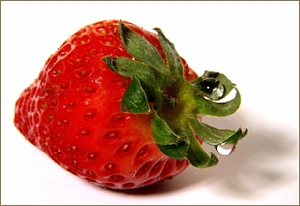 The term vitamins originates from the year 1912. The name has a history and means "vital amines", nitrogen compounds. But the name is actually wrong, because not all vitamins are nitrogen compounds. However, unlike other nutrients (minerals, trace elements), vitamins are always of organic origin.
The term vitamins originates from the year 1912. The name has a history and means "vital amines", nitrogen compounds. But the name is actually wrong, because not all vitamins are nitrogen compounds. However, unlike other nutrients (minerals, trace elements), vitamins are always of organic origin.
A classification of vitamins happens according to their solubility in water or fat. Vitamin A, D, E and K are soluble in fat, all other vitamins are soluble in water.
They are essential nutrients, which means that our body cannot produce these substances itself. An inadequate intake leads to deficiency symptoms and diseases, a longer lasting absence of any supply is fatal. Almost all vitamins are enzymes and coenzymes for a wide range of chemical processes in the human organism.
Some remarks about the intake:
Recommendations about the intake refer exclusively to the situation of healthy
people. This way, a clinically relevant deficiency is ruled out. Latent defects, which may only appear years later are not being considered. Furthermore, the recommended intake does not consider smoking, alcohol consumption, age, diseases, as well as the use of drugs. Also not considered are long-term effects, such as strengthening the immune system and the prevention of degenerative processes, so-called "geriatrics". Moreover the biochemistry of each person is different.
Since the necessary intake of vitamins is hard to define, it is inevitable to define the deficiencies.
It is a proven fact that in Germany many people do not reach the intake recommendations – and these are probably too low. In the region around Augsburg, only 25% of the population reach the recommendation of 12 mg of vitamin E per day. In the “new countries”, only 50% of the recommended amount of vitamin C is reached. Despite adequate food, most people do not achieve the desired amount of vitamins. Over the years this led to a chronic "lack within abundance".
Chemical or natural nutrients?
The discussion about the different effect of "natural" and "artificial" vitamins is scientifically absurd, because it is the same chemical substance. Natural vitamins are concentrated from foods with the help of chemical substances, solvents. Most vitamins can only be manufactured inexpensively by chemical methods.
However, raw fruits don’t consist only of vitamins, they include a variety of enzymes and "active biological substances". In a ripe apple, for example, there is much more than only vitamin C isolated as pure ascorbic acid. The apple also contains all biological precursors of ascorbic acid. While the fruit was ripening, they were building up the Vitamin C. Natural nutrients therefore exist in a biological environment, which significantly affects the compatibility and usability. So it is not only the nutrients themselves that decide how they are processed after being absorbed in the human body, but also the environment in which they are present. Moreover, we still don’t know if the "agents" which nutritional science defines as nutrients are really the “main biological nutrients" when they come as isolated substances. Or are there nutrient complexes that only in their complexity develop the full biological effectiveness in the human body? Vitamin E, for example, is always found in nature in a complex of 8 different compounds. The nutrient beta-carotene, which is known today as antioxidant nutrients and precursor of herbal vitamin A, is only a representative of a group of so far 600 known naturally occurring carotenoids.


